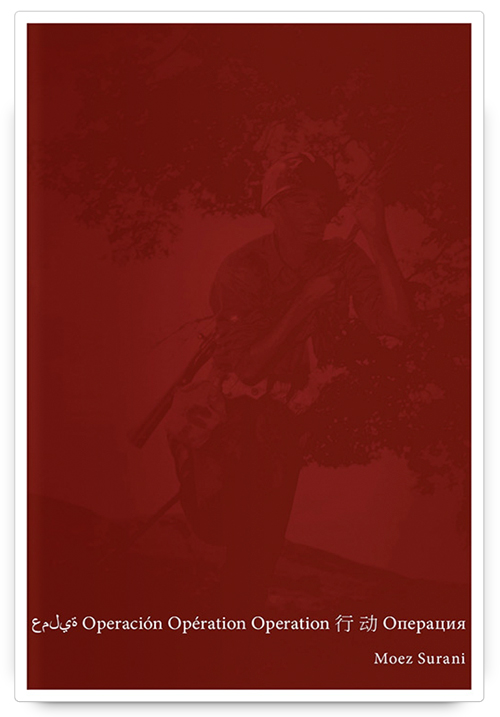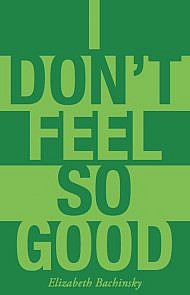Recipient of a 2017 Académie de la vie littéraire Prize
CBC Books Fall 2016 Preview Selection
49th Shelf Most Anticipated Fall 2016 Poetry Preview Selection
From poet-provocateur Moez Surani comes ةيلمع Operación Opération Operation 行 动 Oперация—a book-length poetic inventory of contemporary rhetoric of violence and aggression, as depicted through the evolution of the language used to name the many military operations conducted by UN Member Nations since the organization’s inception in 1945.
With ةيلمع Operación Opération Operation 行动 Oперация, Surani draws from two poetic traditions—conceptual poetry, with its appropriation and filtration of language and its methodological focus on establishing rigorous constraints from which poems develop and emerge; and inventory poems that aggregate small parts into larger, inferred meanings. In so doing, he achieves two important aims: On the one hand, he shows that no word is free from connoting violence—where “tulip” and “grasshopper” are equal to “killer” and “bone breaker,” no word is inherently innocent, beautiful, or good. On the other hand, he provokes people to consider whether their personal values match the values of the military operations that are conducted by their countries, often in the name of protecting and/or representing those same citizens.
By pulling military language away from euphemism—effectively, making it account for its doublespeaking ways— ةيلمع Operación Opération Operation 行动 Oперация documents the chasm that exists between these two sets of values, and gives voice to the many lives lost in conflicts around the world, in a volume that will speak equally to lovers of contemporary poetry, language, and linguistics, as to readers interested in politics, international relations, and public discourse.
Watch the Book Launch and Reading:
Praise for ةيلمع Operación Opération Operation 行动 Oперация:
“Words, first, then evidently turning into names, but names of what? Racking up four thousand military operations by United Nations member states since 1945, Moez Surani’s list is far from simple. Who knew that the UN was writing a long poem? Or that this particular long poem would resound in the mind like Pound’s Cantos, that ‘poem including history’? A stunning compilation of linguistic fertility—and fertilization— courtesy of a political organization listing in the wind over half a century. But it takes a listener to detect that shiver in the atmosphere, and this astonishing book is deep listening through and through.” —Jed Rasula, author of Destruction Was My Beatrice: Dada and the Unmaking of the Twentieth Century
“Moez Surani has written a new kind of elegy.” —Charles Bernstein, author of Attack of the Difficult Poems
“Morning light. June dawns. Moonbeam. Bumblebee. Wren. Tulip. The code names of military operations conducted by the United Nations mark and disguise the costs of war and humanitarian interventions, like modest arrangements of flowers at unseen necropolitical funerals. ةيلمع Operación Opération Operation 行动 Oперация appropriates these code names without deploying the arsenal of juxtaposition, displacement, and framing conceits. It is a stark, stripped down, relentless list poem that organizes and recognizes the many faces and names of historic international cooperation. Surani’s new book reimagines appropriative writing as an “inadvertent collaboration” between nations. It documents the civilian and ecological devastation of collaboration and divests idealism from the notions of “agreement” and “co-production” between imagined and real communities. It is appropriative writing that queries how language is resignified and renovated for artful and affectively profitable cooptation by the state. And, true to the project’s claims, the book eschews the pleasures of euphony, pursuing instead a terrifying cacophony between sound and sense. An unnerving, frightening book that calls for expansive and paratextual reading.”
—Divya Victor, author of Natural Subjects and Kith
Reviews:
“A vast, invisible network of information spiderwebs out from each code word; Surani challenges readers to consider the world beneath this language, and the human toll it both illuminates and obscures.” —Lisa Aitken, Maisonneuve Magazine
“Stripping the language of military operations from the reality of their violence is both absurdly funny and darkly unsettling. Beneath it all hovers the nightmare of real violence, which these too-often-banal names try so hard to mask (such as the euphemism “Clean House”), but sometimes admit (the most honest title here might be the simple Killer).” —Jonathan Ball, Winnipeg Free Press
“Surani has discovered what sweet horror we casually inflict upon the world and has made poetry out of it.” —Michael Dennis, Today’s Book of Poetry
“Enlightenment can be difficult. Operations provides such an experience. Nevertheless, the reader—this reader—can only be grateful for Moez Surani’s thoughtfulness.” —Eileen Tabios, Galatea Resurrects
“At once absurdly funny and utterly grotesque, the poem packs a wallop, chillingly prescient and foreboding. High mass.” —Kirby, Knife Fork Book blog
“Operations by Moez Surani is an incantatory feat.” —Alice Burdick, Lexicon Books
“Much like The Iliad, which lists names of combatants (if not casualties) in a roll call, so also does this poem itemize the “enlisted” language drafted into service by every armed force in the world.” —Christian Book, The Brooklyn Rail
“The language that shapes and records these outbursts of violence are like cyclones uprooting the truth.” —Gregory Betts, The Sound
Interviews and Profiles:
The Entitled Interview with Moez Surani —Open Book
Toronto Poet Traces the History of UN Violence —Toronto Star
The 150-page Poem that Moez Surani Spent Four Years Writing —CBC Books
Most Engaging Books of 2016 —Derek Beaulieu
Year End Reading —Robin Richardson, The League of Canadian Poets blog
Year End Reading Kate Sutherland, The League of Canadian Poets blog
Q&A with Moez Surani: ‘Countries survive by projecting an identity that’s virtuous and noble’ —The Globe and Mail
Poets Resist: Moez Surani —All Lit Up
Moez Surani has travelled, studied, and worked in countries around the world. His writing has been featured in numerous publications, including the Best Canadian Poetry (2013 and 2014), The Walrus, The Globe and Mail, Harper’s Magazine, and PRISM International. His first poetry collection, Reticent Bodies (Wolsak and Wynn), was published in 2009. In that same year, he won a Chalmers Arts Fellowship, and later, attended artists’ residencies in Italy, Finland, Latvia, Switzerland, Taiwan, and Canada. His second poetry collection, Floating Life (Wolsak and Wynn), was published in 2012. ةيلمع Operación Opération Operation 行动 Oперация, Surani’s third book, was a finalist for 2014 Les Figues Press Book Prize.
Additional information
| Dimensions | 8 × 525 in |
|---|






